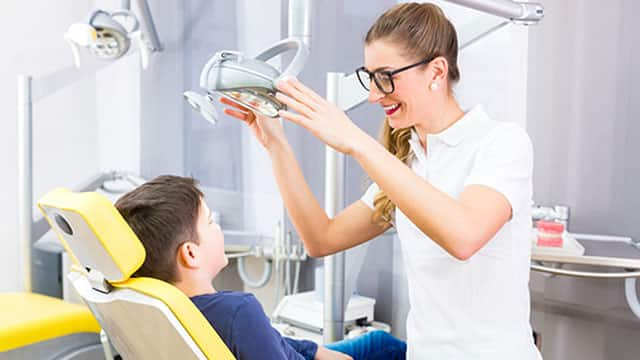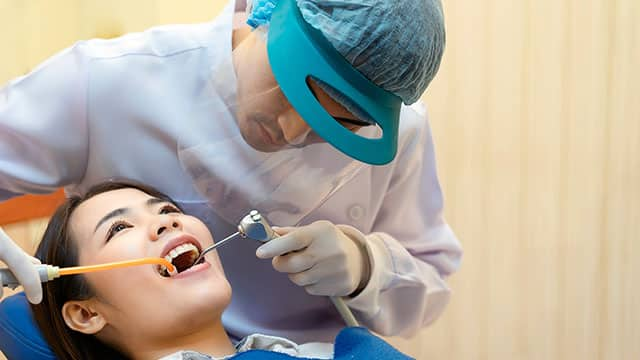What Are Tooth Fillings and Why Are They Needed?
Most often, fillings are used to fill a decaying portion of a tooth (a cavity). It may sound alarming to have tooth decay at a young age, but it's also surprisingly common. According to the most recent evaluation by the Centers for Disease Control and Prevention (CDC), the prevalence of total dental cavities (untreated and treated) was 45.8% in 2015-2016. By teaching your children to practice good oral hygiene, you can help them effectively prevent cavities and the fillings required to treat them.
Learn how to teach your kids to brush and floss.
Fillings aren't only for cavities, though. They can also be used to fix teeth damaged by grinding (bruxism) and broken teeth.
Learn about tooth filling options.
How to Prepare Your Child for Their Appointment
When you talk with your child about the procedure for filling their cavity, it's best not to make too big of a deal about the whole thing. Keep the topic light and positive, and pay special attention to avoid any words that may scare them, like "sharp, "needle," or "drill."
Pediatric dental professionals receive specialized training to talk with children about each part of the procedure, so it may be best to leave the details to them. And make sure you have your child brush their teeth before the treatment to remove any leftover food in their teeth.
Topical and local anesthesia are most commonly used for pediatric fillings. If your child is undergoing general anesthesia for the procedure, your dental professional will likely recommend that they fast for a certain amount of time before the appointment. For instance, the Mayo Clinic says that avoiding meals is usually necessary for about six hours before you undergo anesthesia.
The American Dental Association (ADA) recommends asking these questions about anesthesia before your child's appointment:
- Will you need to give your child any medication before coming into the office?
If so, should there be anything else you need to know? Anything you need to look out for? - How long should your child fast before the procedure?
General anesthesia will relax muscles that keep food and acid in your child's stomach and out of their lungs, so their stomach must be empty.
- Who is going to evaluate your child before the procedure?
Someone should be looking into your child's medical history, current prescriptions, allergies, previous illnesses, and hospitalizations. - What level of sedation or general anesthesia will your child be given?
Is it only local anesthesia (wide awake), moderate sedation (a little sleepy), deep sedation (very sleepy), or general anesthesia (sleeping)? - Does the person who is giving the sedation or anesthesia have the required training?
Check to ensure the dentist has all the permits or licenses required by the state dental board to provide the planned level of anesthesia or sedation. It's also worth asking if the staff who will assist have emergency training and regularly renew their training. - How will your child be monitored before, during, and after the procedure until they are in your care again?
Check to make sure at least two people with the proper training are there during your child's procedure and that appropriate emergency medications and equipment are immediately available if needed. - Are there any instructions and emergency contact information if there are complications after returning home?
You likely won't need to use this information, but if anything happens to go wrong after you get home, you'll be grateful to know exactly what to do and who you can call to remedy the situation.
What Happens During a Tooth Filling?
Filling procedures usually take about an hour. Your child's dental professional may provide short breaks as needed to help keep your child calm. Some offices offer movies and music during the procedure to distract kids during treatment.
During the procedure, the team of pediatric dental professionals will:
- Take any x-rays, if needed
- Put your child at ease, and may even try to make the experience fun
- Explain what they'll be doing
- Use a localized (and at times general) anesthetic
- Drill out any area of tooth decay
- And put the filling in your child's tooth
If your child has one or more teeth that need to be treated, they may schedule multiple visits to ease your child's amount of stress.
Treating Your Child's Tooth Pain After They Get a Filling
After the procedure, your child's local anesthetic could still be in effect for about one to three hours. Be sure to remind your child not to chew on their tongue or bite their cheek during this time.
After getting a filling, a bit of pain and sensitivity is normal for adults and kids alike, but sensitivity and swelling should last only a day or two at the most. If pain or swelling persists, make a follow-up appointment right away.
After your child's filling treatment, some tips to help you care for your child include:
- Limit your child's diet to soft foods for one to two days until sensitivity and swelling decrease.
- Your child's dental professional may recommend not eating on the side of the mouth your child's filling is on for up to 24 hours.
- Limit the use of straws and sippy cups the first few days as the sucking action can prolong sensitivity.
- Use a cold compress on the area for 15 minutes on and off.
- Administer children's acetaminophen as prescribed.
- Closely monitoring for continued swelling or sensitivity beyond two days.
- And avoid heavy activity the day of and after the dental filling.
Brushing and Flossing After a Filling Procedure
Consider getting a toothbrush with soft bristles and remind your child to brush the filling area gently. If your child uses floss or interdental brushes, be sure they don't pull up on the area around the filling. Water flossers are a great way to clean the gums and between the teeth – be sure your child doesn't angle the water stream in a way that could dislodge the filling. By paying special attention and care to the filling area, your child's filling will last a long time.
A bit of love, care, and positivity goes a long way in helping your child manage sensitivity in their teeth after a filling. By knowing what to expect, showing your child that you're confident about the process yourself, and being prepared to comfort your child until the sensitivity goes away, you'll be able to make your child's tooth filling an experience you can both smile about.
Oral Care Center articles are reviewed by an oral health medical professional. This information is for educational purposes only. This content is not intended to be a substitute for professional medical advice, diagnosis or treatment. Always seek the advice of your dentist, physician or other qualified healthcare provider.
ORAL HEALTH QUIZ
What's behind your smile?
Take our Oral Health assessment to get the most from your oral care routine
ORAL HEALTH QUIZ
What's behind your smile?
Take our Oral Health assessment to get the most from your oral care routine














